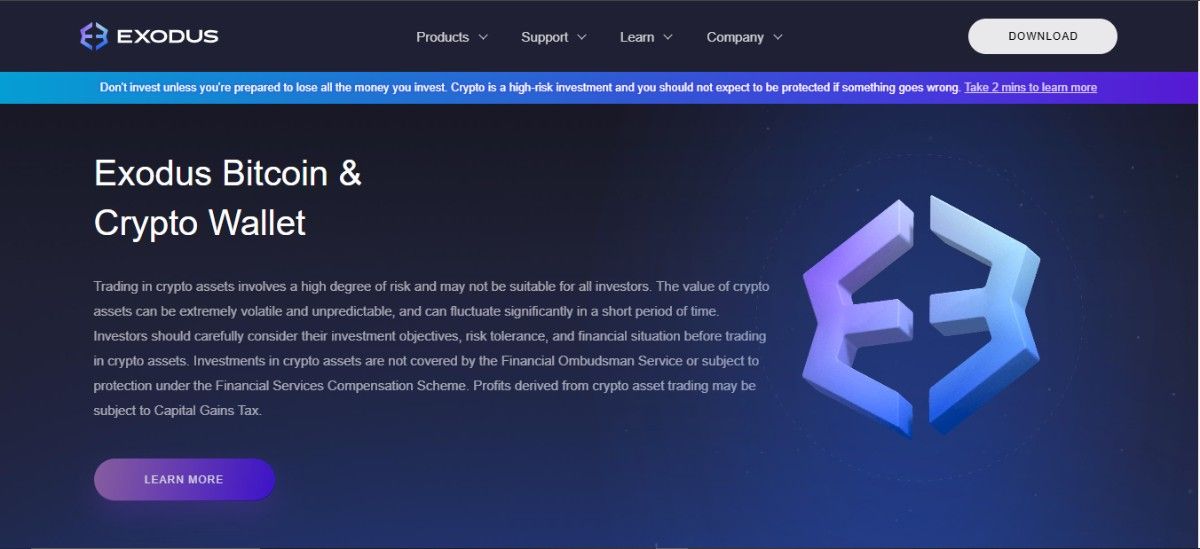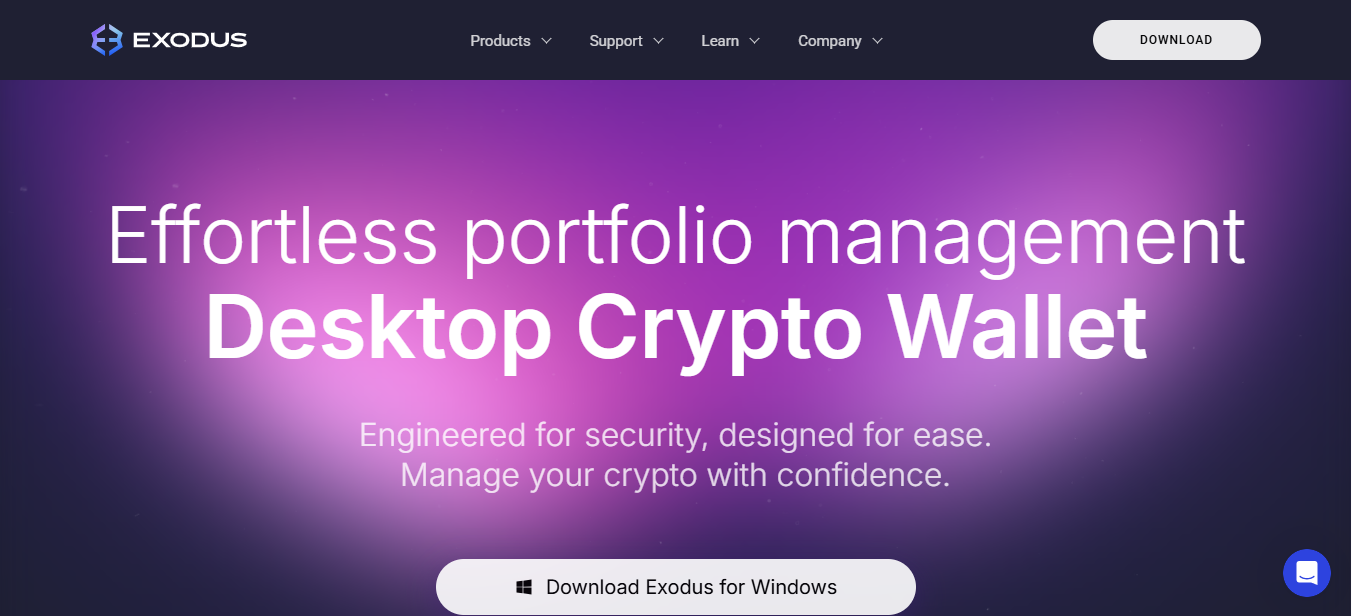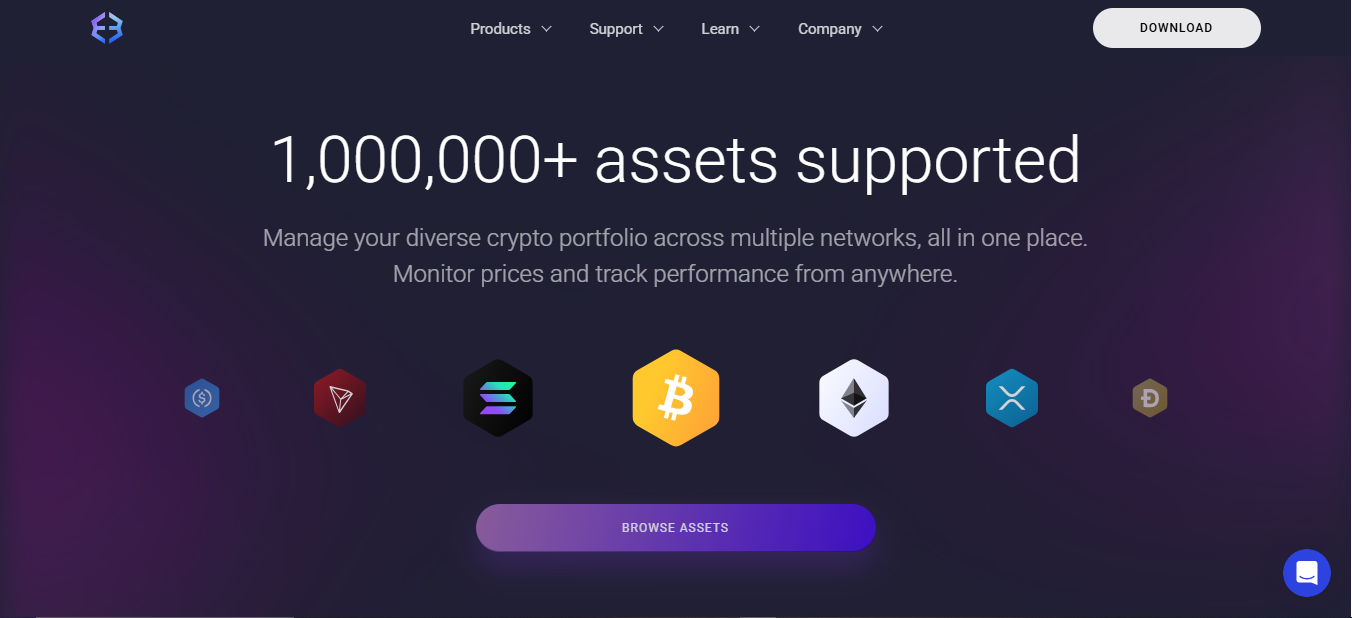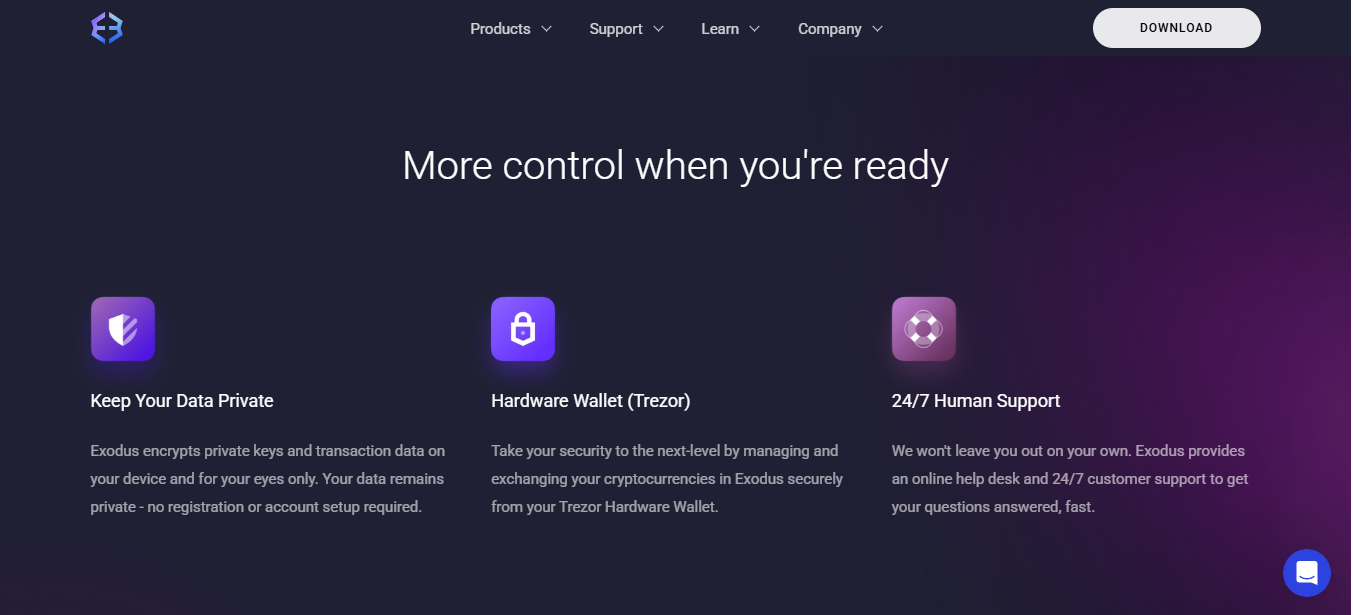Crypto’s increasing mainstream use has made it a bigger target for risks. From exchange collapses to phishing scams and unauthorised access, the need for self-custody and personal control over digital assets has never been more urgent. For many users, especially those looking to store and spend cryptocurrency rather than simply hold it, a wallet is not just a tool; it’s the gateway to everything they do in the cryptocurrency space. Unfortunately, many wallets in the UK market either sacrifice simplicity for advanced features or limit control by remaining custodial.
This is precisely the gap that wallets like Exodus aim to fill. For users seeking to protect their crypto and still enjoy everyday convenience, this wallet balances security with reliability, making it a strong contender. In this Exodus wallet review, we’ll examine its features, security measures, usability, and how well it meets the evolving needs of crypto holders in the UK. Let’s get started.
Table of Contents
- A quick overview of the Exodus wallet
- How Does the Exodus Wallet Work in the UK?
- Key Exodus wallet features for UK users
- The List of Cryptocurrencies Supported by Exodus Wallet
- Exodus wallet fees and costs explained for UK traders
- Exodus Wallet’s Pros and Cons
- Exodus Wallet vs Trust Wallet
- FAQs
- Conclusion

A quick overview of the Exodus wallet
The Exodus cryptocurrency wallet is a non-custodial software wallet designed to help users securely store, manage, and exchange digital assets. It operates across both desktop and mobile platforms, providing a consistent and efficient user experience. As a storage solution, the wallet ensures that users retain full control of their private keys and digital funds, without reliance on third-party custodians. It also includes integrated features such as a portfolio tracker and a built-in exchange, offering essential tools for digital asset management within a single application.
How Does the Exodus Wallet Work in the UK?
In the United Kingdom, the Exodus wallet operates as a self-custody platform, enabling users to send, receive, and store cryptocurrencies securely without relying on third-party custodians. While the core wallet functionalities remain accessible to UK-based users, there are important regulatory and compliance-related limitations that must be considered.
A key limitation is the unavailability of the staking feature for users in the UK. This restriction is in place due to Exodus’s commitment to adhering to relevant UK regulatory requirements. Those who have engaged in staking on the platform are expected to unstake their holdings promptly to meet prevailing compliance standards.
The platform does not require users to undergo Know Your Customer (KYC) verification to access its services. While this allows for a fast and private setup process, it also places full responsibility on users to manage their security, including the safeguarding of private keys and recovery phrases.
The Exodus wallet remains a viable option for UK users seeking a non-custodial solution for basic crypto transactions. However, users must remain informed of the regulatory environment, understand the limitations of available features, and take proactive steps to protect their assets.
Is Exodus Crypto Wallet Relevant for UK traders?
The Exodus crypto wallet holds strong relevance for UK traders, primarily due to its alignment with the growing demand for secure, user-controlled digital asset management. In evaluating the relevance of a crypto wallet, key considerations include its ability to facilitate self-custody, ensure ease of access, and operate independently of centralised platforms. As more traders seek to transition away from custodial exchanges, the importance of having a reliable, accessible wallet that supports full user ownership becomes increasingly evident. The platform addresses these priorities by offering a solution that supports asset control without unnecessary complexity, positioning it as a suitable option for users seeking autonomy and convenience. Its cross-platform functionality further enhances its appeal, providing consistent access across desktop and mobile environments, an important factor for traders who require flexibility and reliability in managing their digital portfolios.
Can UK Users Access Exodus Wallet both on Desktop and Mobile?
UK users have full access to the Exodus wallet on both desktop and mobile platforms. The desktop version is compatible with Windows, macOS, and Linux operating systems, and can be downloaded directly from the official Exodus website. For mobile use, the wallet is available as a native application for both Android and iOS devices, accessible through the Google Play Store and Apple App Store. Users may link their desktop and mobile wallets securely, allowing seamless synchronisation and consistent access to their digital assets across devices. This dual accessibility provides flexibility and convenience for users who require reliable asset management at home or while on the move.

Key Exodus wallet features for UK users
Multi-Asset Support
Exodus allows users to store, manage, and exchange over 260 cryptocurrencies, including Bitcoin, Ethereum, and several stablecoins, all within one application.
Cross-Platform Accessibility
The wallet is available on desktop and mobile devices, with real-time synchronisation, enabling users to manage their portfolios seamlessly across platforms.
Built-In Exchange
Exodus includes an integrated swap feature, allowing users to exchange one cryptocurrency for another directly within the wallet, without needing to use external exchanges.
Hardware Wallet Integration
For enhanced security, Exodus supports integration with the Trezor hardware wallet, enabling users to manage cold storage assets through the same interface.
No Account or KYC Required
Users can download and begin using the wallet without creating an account or submitting personal information, supporting privacy and ease of access.
Real-Time Portfolio Tracking
Exodus provides an automatically updated portfolio overview, displaying asset values and market trends to help users monitor their holdings with clarity and precision.

The List of Cryptocurrencies Supported by Exodus Wallet
The Exodus wallet currently supports over 260 cryptocurrencies and thousands of digital assets, making it one of the most versatile software wallets available to individual users. This includes major cryptocurrencies such as Bitcoin (BTC), Ethereum (ETH), and Solana (SOL), as well as a broad selection of altcoins, stablecoins, and tokenised assets across multiple blockchains. Exodus continuously updates its asset support based on user demand and network developments, allowing users to store, manage, and exchange a wide variety of assets within one secure platform. This level of compatibility provides users with the flexibility to diversify their holdings without relying on multiple wallets or third-party services.
Exodus wallet fees and costs explained for UK traders
Exodus does not charge any fees for sending or receiving cryptocurrencies. Instead, users are responsible for paying the standard network transaction fees, which are determined by the blockchain network being used. These fees are paid directly to network validators or miners and are not collected by the wallet.
When using the built-in exchange feature to swap one cryptocurrency for another, the platform does not charge a fixed trading fee but applies a spread on each transaction. This spread typically ranges between 1% and 3%, depending on market conditions and the specific assets involved.
For users purchasing cryptocurrency with fiat, such as buying Bitcoin using Apple Pay on iOS devices, standard third-party processing fees may apply, and the final cost is clearly displayed before the transaction is completed. The wallet also allows users to set custom network fees for certain transactions, such as Bitcoin and Ethereum transfers, enabling greater flexibility in managing speed and cost.
Importantly, Exodus does not impose any withdrawal fees, inactivity charges, account maintenance fees, or subscription costs. For UK-based users, this structure provides a reliable and cost-efficient option for managing digital assets, with no hidden fees or unexpected charges beyond what is required by the network or third-party services.
Exodus Wallet’s Pros and Cons
Pros
- Cross-chain swaps via XoSwap.
- In-app crypto-to-crypto exchange.
- Hardware wallet integration (e.g., Trezor).
- Custom network fees for Bitcoin, Ethereum, and ERC20 token transactions.
- Automatic portfolio tracking and charts.
- 24/7 human customer support via chat and email.
- Regular software updates and feature enhancements.
Cons
- Not fully open-source, limiting independent code audits.
- No support for multi-signature wallet security.
- No advanced trading features for the mobile app.
- No support for two-factor authentication (2FA).
- Limited options for fiat deposits and withdrawals.
Exodus Wallet vs Trust Wallet
When comparing Exodus Wallet and Trust Wallet, both serve as secure, user-friendly platforms for managing digital assets, but they differ in structure, functionality, and user experience, especially in ways that matter to UK users. Trust Wallet supports a broader selection of cryptocurrencies and decentralised applications (dApps), making it appealing to users who engage heavily with DeFi and token-rich ecosystems. It is also fully open source, which can provide additional transparency for more technically inclined users.
However, Exodus Wallet distinguishes itself through its streamlined design, strong focus on ease of use, and seamless desktop-to-mobile synchronisation. While it supports fewer cryptocurrencies than Trust Wallet, Exodus prioritises quality and stability, ensuring a smooth experience across supported assets. For UK users, this simplicity can be particularly advantageous. Many beginners and self-custody seekers in the UK prefer wallets that require minimal setup, do not enforce Know Your Customer (KYC) processes, and offer clear access to features like portfolio tracking and built-in crypto swaps, capabilities that Exodus provides in a cohesive and professional interface.
Another area where Exodus stands out is customer support, as it maintains an in-house support team and comprehensive help resources. This represents an important consideration for UK users who value responsive assistance and reliable guidance when navigating their crypto journey.
Although it is not fully open source, and its asset support is more curated, the user experience, cross-platform compatibility, and dedicated customer service make Exodus a practical and secure choice for everyday crypto holders. For those seeking a stable, non-custodial environment that doesn’t compromise on usability, the overall opinion on Exodus Wallet remains positive.

FAQs
How User-friendly is Exodus’ Customer Support in the UK?
Exodus offers highly accessible and responsive customer support for users in the UK, which is generally viewed positively. Unlike many competing wallets, it provides 24/7 human support through live chat and email, ensuring that users can receive timely assistance when needed. The platform also maintains a well-structured knowledge base that simplifies issue resolution.
Is Exodus Wallet Safe to Use in the UK?
Exodus Wallet is considered safe for use in the UK, offering a high level of user control and data protection. It employs strong encryption protocols, local storage of private keys, and backup tools that allow users to recover funds if needed. The wallet’s compatibility with Trezor hardware devices adds a layer of offline protection. Unlike custodial platforms, Exodus does not store user information or private keys on external servers, reducing exposure to breaches. Its consistent software updates, responsive support team, and absence of mandatory verification processes further enhance its reliability as a secure environment for digital asset management.
Is KYC Required for UK Users to Access the Exodus Wallet?
KYC is not required for UK users to access or use the Exodus wallet. This is because Exodus operates as a self-custodial platform, meaning it does not hold user funds or personal data, and therefore has no obligation to collect identity information. For users in the UK, this approach offers greater privacy and faster onboarding, eliminating the delays and friction often associated with verification processes. However, it also places full responsibility for security on the user, as there is no recovery support tied to identity. As a result, users must take personal steps to safeguard their private keys and recovery phrases.
Is Coinbase Wallet Better than Exodus Wallet for UK traders?
While Coinbase Wallet offers broader dApp integration and direct Web3 access, it lacks the cohesive experience and streamlined interface that Exodus delivers. Exodus holds greater practical value because its design reduces operational complexity without compromising functionality, ideal for users moving off exchanges. Coinbase Wallet’s Web3 tools cater more to advanced users, while Exodus provides a secure, refined environment suited to everyday traders seeking autonomy without navigating the technical depth of decentralised protocols.
Conclusion
This Exodus wallet review addresses the importance of having full control over one’s digital assets, especially in an environment where privacy and personal responsibility are paramount. In today’s crypto environment, careful use of wallets like Exodus can help UK holders maintain greater control, privacy, and asset security. Beyond just storage, a well-maintained wallet supports long-term financial autonomy by reducing third-party risk and dependency. As threats to digital wealth persist, users must stay proactive, safeguard their keys, and stay vigilant in checking that their wallets offer dependable protection and practical usability.





 usdt
usdt xrp
xrp

